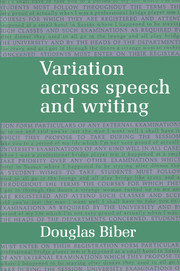Book contents
- Frontmatter
- Contents
- List of figures
- List of tables
- Acknowledgments
- Part I Background concepts and issues
- 1 Introduction: textual dimensions and relations
- 2 Situations and functions
- 3 Previous linguistic research on speech and writing
- Part II Methodology
- Part III Dimensions and relations in English
- Appendix I Texts used in the study
- Appendix II Linguistic features: algorithms and functions
- Appendix III Mean frequency counts of all linguistic features in each genre
- Appendix IV Pearson correlation coefficients for all linguistic features
- References
- Index
1 - Introduction: textual dimensions and relations
Published online by Cambridge University Press: 05 June 2012
- Frontmatter
- Contents
- List of figures
- List of tables
- Acknowledgments
- Part I Background concepts and issues
- 1 Introduction: textual dimensions and relations
- 2 Situations and functions
- 3 Previous linguistic research on speech and writing
- Part II Methodology
- Part III Dimensions and relations in English
- Appendix I Texts used in the study
- Appendix II Linguistic features: algorithms and functions
- Appendix III Mean frequency counts of all linguistic features in each genre
- Appendix IV Pearson correlation coefficients for all linguistic features
- References
- Index
Summary
Introduction
A considerable body of research in the humanities and social sciences has dealt with the similarities and differences between speech and writing. Work in history, sociology, anthropology, psychology, education, comparative literature, and linguistics has described ways in which the choice between speech and writing is closely related to developments in other social institutions. For example, the development of widespread alphabetic literacy in ancient Greece was probably a catalyst for other social and intellectual developments there. Widespread literacy enabled a fuller understanding and participation by citizens in the workings of government, which might have promoted a democratic form of government in which citizens play a relatively active role. Literacy enabled a permanent, accurate record of ideas and the possibility of knowledge without a living ‘knower’. As such it probably aided in the transition from ‘myth’ to ‘history’ and the development of critical attitudes towards knowledge. Prior to literacy and a permanent record of beliefs and knowledge, a society can alter its beliefs and not be faced with the possibility of a contradiction; competing ideas which evolve slowly over generations will be accepted as equally factual when there is no contradictory record of earlier ideas. Written records, however, force us to acknowledge the contradictory ideas of earlier societies and thus to regard knowledge with a critical and somewhat skeptical attitude. For example, we know that earlier societies believed that the earth was flat, because these beliefs are permanently recorded in writing.
Information
- Type
- Chapter
- Information
- Variation across Speech and Writing , pp. 3 - 27Publisher: Cambridge University PressPrint publication year: 1988
Accessibility standard: Unknown
Why this information is here
This section outlines the accessibility features of this content - including support for screen readers, full keyboard navigation and high-contrast display options. This may not be relevant for you.Accessibility Information
- 2
- Cited by
